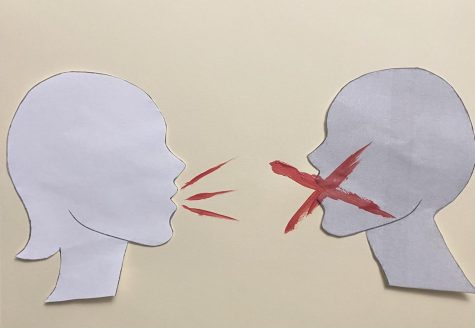Our voices matter
Freedom of speech in high school, where does it cross the line?

Freedom of speech can bring many wonderful ideas to the table, but can somebody’s words be deemed as unacceptable? Free speech in schools has always been a controversial topic.
Freedom of speech is defined as “the right to express any opinions without censorship or restraint.” There can be many benefits to being able to express yourself and talk freely. You can feel understood and find others with the same opinions. However, while our words are what bring us together they also tear us apart.
Free speech at Norwin has recently been a topic of conversation. In fact, 79% of Norwin students who partook in a recent newspaper survey said “there should be limits to freedom of speech if it negatively affects other people.”
Clearly, Norwin students recognize free speech but think there needs to be limits as well. Free speech in high schools, however, is not a new concept. The urge for people to verbalize their views has been around even before the First Amendment was created. There are plenty of famously known court cases that represent this cause. According to the fire.org, one of these would be Hazelwood School District v. Kuhlmeier:
“In Hazelwood, the Court upheld a school principal’s decision to delete stories about student pregnancies and divorced parents before they appeared in the student newspaper. The Court reasoned that the publication of the school newspaper, which was written and edited as part of a journalism class, was a part of the curriculum and a regular classroom activity. It wrote: “[E]ducators do not offend the First Amendment by exercising editorial control over the style and content of student speech in school-sponsored expressive activities so long as their actions are reasonably related to legitimate pedagogical concerns.”
Times are changing. Subjects that were once too taboo can be openly talked about in today’s society. The things that were at one time considered “acceptable” by some, may not be now.
According to the Freedom Forum Institute: “Though public school students do possess First Amendment freedoms, the courts allow school officials to regulate certain types of student expression. For example, school officials may prohibit speech that substantially disrupts the school environment or that invades the rights of others.”
Offensive and hurtful words are one of the downfalls of this freedom. Sure, high schoolers are still learning and becoming the people they want to be, but that is not a justification to misuse this privilege as a way to spread hate.
The survey asked Norwin students: ”Do you think freedom of speech is ever used as an excuse to be hateful? How?” Many students responded and one student said: ”Yes, I think that since we have this freedom people take advantage of it by telling lies, spreading rumors, saying harmful things, ect,” said a female freshman student at Norwin. “I don’t think this freedom should be taken away, but there are some times when people take advantage of it.”
Norwin students believe certain topics cross the line from free speech into hate speech. According to the Norwin poll, 84 percent of students said wearing the Confederate flag crosses the line. Another 91 percent of Norwin students polled said criticizing others’ religious or spiritual beliefs crossed the line.
“I have heard pretty offensive things said in the halls to a point where it makes me uncomfortable and I know it hurts others,” said an anonymous senior.
As growing, maturing young adults, having this right has a big impact on finding who you are as a person. While there can be negatives and wrong ways to use this privilege, there are a massive amount of upsides.
“It’s important to understand the attitudes and perceptions of future generations, because they’re the ones who will ultimately be shaping norms, and norms often have sway on policy and the way the First Amendment is protected,” said Jon Sotsky, the Knight Foundation’s Director for Strategy and Assessment.
Whether it is just a normal conversation or written words in a school published story, where would we be without our freedom of speech?
“Our newspaper class students mostly try to cover school events but they also get a choice of what they want to write about,” said Mr. Fleckenstein. “I think it is very important for teenagers to develop their voice.”
As teenagers still in high school, our voices are what define us. Having an environment where we can actively use them and feel safe while doing so is essential. We can all collectively improve on creating a space where everyone feels they can use their voice and find more of a sense of self.






